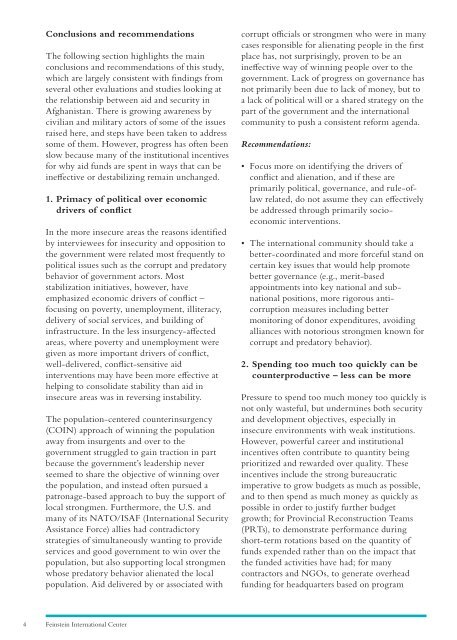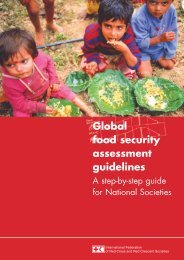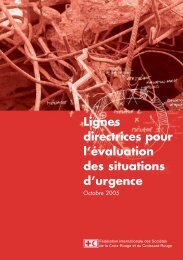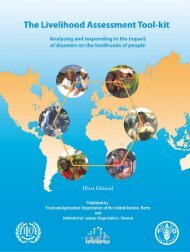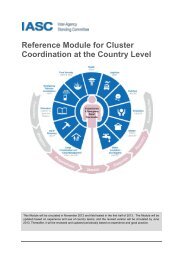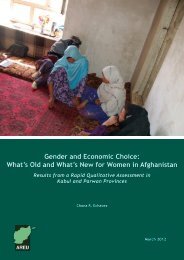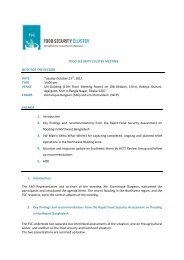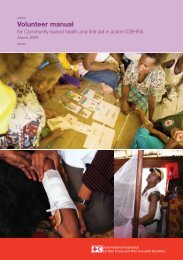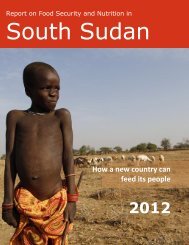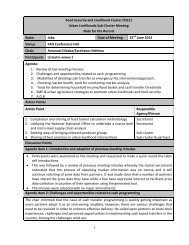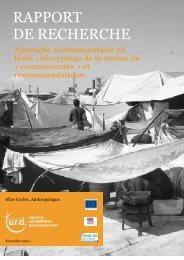Winning Hearts and Minds? - Tufts - Tufts University
Winning Hearts and Minds? - Tufts - Tufts University
Winning Hearts and Minds? - Tufts - Tufts University
Create successful ePaper yourself
Turn your PDF publications into a flip-book with our unique Google optimized e-Paper software.
Conclusions <strong>and</strong> recommendationsThe following section highlights the mainconclusions <strong>and</strong> recommendations of this study,which are largely consistent with findings fromseveral other evaluations <strong>and</strong> studies looking atthe relationship between aid <strong>and</strong> security inAfghanistan. There is growing awareness bycivilian <strong>and</strong> military actors of some of the issuesraised here, <strong>and</strong> steps have been taken to addresssome of them. However, progress has often beenslow because many of the institutional incentivesfor why aid funds are spent in ways that can beineffective or destabilizing remain unchanged.1. Primacy of political over economicdrivers of conflictIn the more insecure areas the reasons identifiedby interviewees for insecurity <strong>and</strong> opposition tothe government were related most frequently topolitical issues such as the corrupt <strong>and</strong> predatorybehavior of government actors. Moststabilization initiatives, however, haveemphasized economic drivers of conflict –focusing on poverty, unemployment, illiteracy,delivery of social services, <strong>and</strong> building ofinfrastructure. In the less insurgency-affectedareas, where poverty <strong>and</strong> unemployment weregiven as more important drivers of conflict,well-delivered, conflict-sensitive aidinterventions may have been more effective athelping to consolidate stability than aid ininsecure areas was in reversing instability.The population-centered counterinsurgency(COIN) approach of winning the populationaway from insurgents <strong>and</strong> over to thegovernment struggled to gain traction in partbecause the government’s leadership neverseemed to share the objective of winning overthe population, <strong>and</strong> instead often pursued apatronage-based approach to buy the support oflocal strongmen. Furthermore, the U.S. <strong>and</strong>many of its NATO/ISAF (International SecurityAssistance Force) allies had contradictorystrategies of simultaneously wanting to provideservices <strong>and</strong> good government to win over thepopulation, but also supporting local strongmenwhose predatory behavior alienated the localpopulation. Aid delivered by or associated withcorrupt officials or strongmen who were in manycases responsible for alienating people in the firstplace has, not surprisingly, proven to be anineffective way of winning people over to thegovernment. Lack of progress on governance hasnot primarily been due to lack of money, but toa lack of political will or a shared strategy on thepart of the government <strong>and</strong> the internationalcommunity to push a consistent reform agenda.Recommendations:• Focus more on identifying the drivers ofconflict <strong>and</strong> alienation, <strong>and</strong> if these areprimarily political, governance, <strong>and</strong> rule-oflawrelated, do not assume they can effectivelybe addressed through primarily socioeconomicinterventions.• The international community should take abetter-coordinated <strong>and</strong> more forceful st<strong>and</strong> oncertain key issues that would help promotebetter governance (e.g., merit-basedappointments into key national <strong>and</strong> subnationalpositions, more rigorous anticorruptionmeasures including bettermonitoring of donor expenditures, avoidingalliances with notorious strongmen known forcorrupt <strong>and</strong> predatory behavior).2. Spending too much too quickly can becounterproductive – less can be morePressure to spend too much money too quickly isnot only wasteful, but undermines both security<strong>and</strong> development objectives, especially ininsecure environments with weak institutions.However, powerful career <strong>and</strong> institutionalincentives often contribute to quantity beingprioritized <strong>and</strong> rewarded over quality. Theseincentives include the strong bureaucraticimperative to grow budgets as much as possible,<strong>and</strong> to then spend as much money as quickly aspossible in order to justify further budgetgrowth; for Provincial Reconstruction Teams(PRTs), to demonstrate performance duringshort-term rotations based on the quantity offunds expended rather than on the impact thatthe funded activities have had; for manycontractors <strong>and</strong> NGOs, to generate overheadfunding for headquarters based on program4Feinstein International Center


